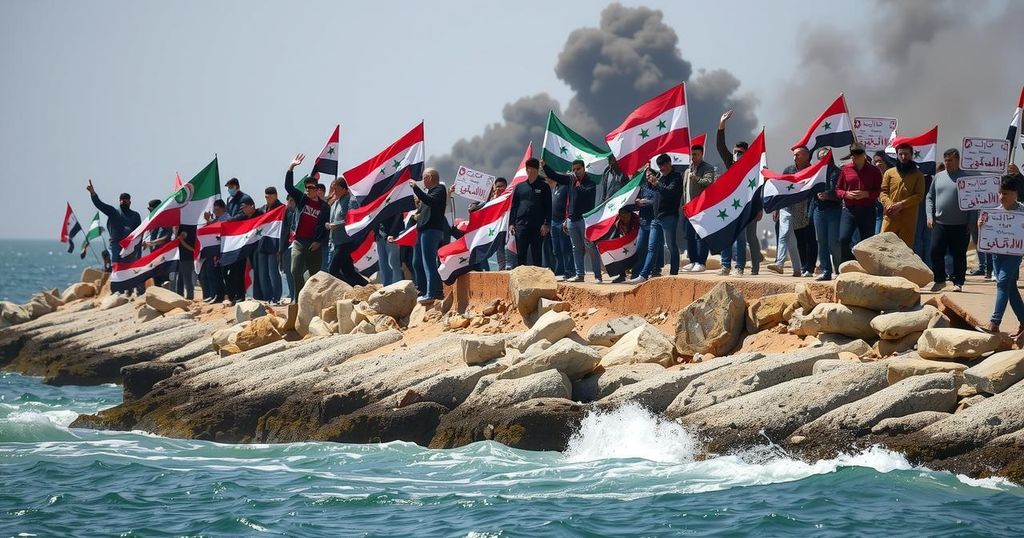Protests in Syria’s coastal cities have been linked to Iranian and Hezbollah interference, as Colonel Riyad al-Asaad alleges that they incite chaos through Assad regime remnants. The unrest escalated after sectarian provocations, leading to violent confrontations and military responses. Analysts express concern over Iranian efforts to manipulate post-Assad political dynamics, with calls for stability amidst regional tensions.
Protests have surged in Syria’s coastal cities, with Colonel Riyad al-Asaad, the founder of the Free Syrian Army, asserting that the Iranian regime and Hezbollah are instigating these disturbances through remnants of the Assad administration. Al-Asaad disclosed in an interview with Al-Hadath TV that intelligence confirms Hezbollah’s involvement in exacerbating chaos within Syria. The recent unrest appears to have stemmed from the resurfacing of a video depicting an assault on an Alawite shrine, fueling a narrative of sectarian division and unrest.
Amidst escalating tensions and armed confrontations, reports indicate that Hezbollah has deployed operatives from Lebanon to revive its influence in strategic Syrian regions. Notably, clashes in Talkalakh have intensified following the death of Shuja al-Ali, a militia leader entwined with Hezbollah, which Colonel al-Asaad described as a pivotal moment that would aid in restoring stability to Homs and its neighboring areas.
Initially sparked by peaceful demonstrations, the situation deteriorated into violent confrontations due to live fire from regime-aligned forces. Local accounts suggest that loyalists of the Assad regime, emboldened through Iranian support, launched surprise attacks on military units backing the new regime. These confrontations have prompted increased security measures in regions like Talkalakh and Tartus, where Hezbollah’s operatives have become targets of law enforcement.
Military actions taken in response to these clashes suggest a focus on reestablishing order, with reports of significant arrests of Assad loyalists and the neutralization of figures like al-Ali aiding stabilization efforts. The demonstrations and their timing have raised questions regarding the Iranian regime’s role in orchestrating unrest to sway the power dynamics in post-Assad Syria.
Iranian officials have publicly projected optimism over the emergence of a powerful Syrian resistance, with Supreme Leader Ali Khamenei insinuating that determined Syrian youth could counteract destabilizing forces. Despite these claims, the Arab League has condemned Iranian interference, urging Tehran to cease its destabilizing activities. The continuation of the current Iranian regime threatens to perpetuate conflict within the region, complicating the pursuit of enduring peace in the Middle East.
Recent protests in Syria have been attributed to the complex interplay of local discontent and external influences, specifically the involvement of Iranian proxies and Hezbollah. The political landscape in Syria remains volatile following the fall of Bashar al-Assad, with various factions vying for power. The Iranian regime’s historical reliance on militia networks in Syria to maintain its influence has drawn scrutiny as the country navigates its post-Assad transition. This backdrop of sectarian tensions and military clashes reveals an intricate struggle for control over Syria’s future, exacerbated by Iranian meddling.
In summary, the protests in Syria’s coastal regions signify a critical juncture in the ongoing struggle for power in the country. Charges of Iranian and Hezbollah involvement in instigating unrest highlight the complexities of foreign influence in Syria’s post-Assad environment. The situation is compounded by the volatile response of local forces and the implications of external declarations regarding stability and resistance. The Arab League’s denunciation of Iranian actions underscores a regional concern over ongoing interference, which hinders the prospect of achieving lasting peace in the Middle East.
Original Source: www.ncr-iran.org






